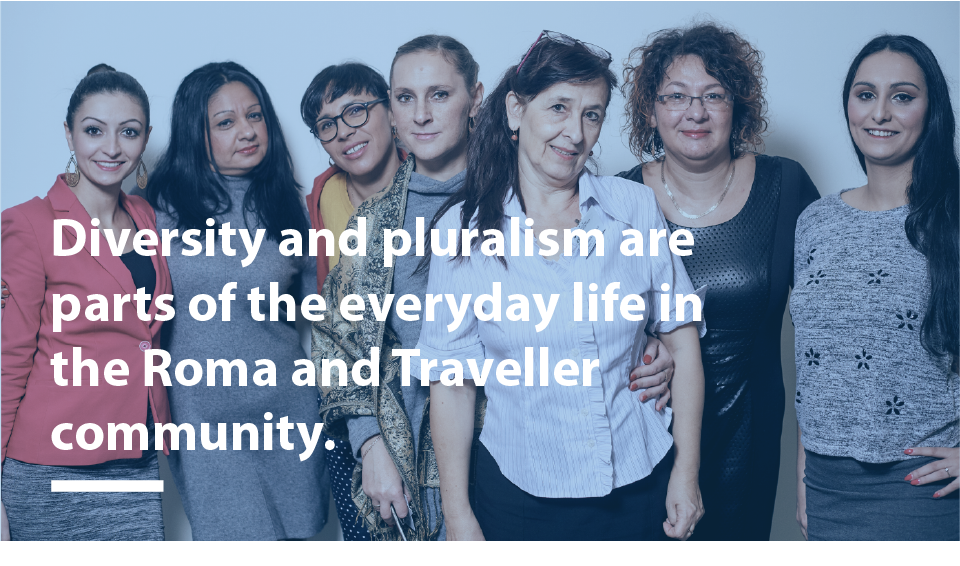Egalité de genre
A large number of Roma and Traveller women and girls continue to face multiple discrimination in various areas, ranging from health to employment and education, amongst others. They also have limited opportunities to influence the policies that most concern them.
Gender equality is one of the Council of Europ’s core values. All people, in all their diversity, should be free to live their chosen life, thrive socially and economically, participate and take a lead as equals. Women and girls are key agents of development and change. Achieving gender equality and empowering women and girls is vital to building fair, inclusive, prosperous and peaceful societies everywhere.
The Roma and Travellers Team contributes to the mainstreaming of Roma and Traveller gender equality issues within the Strategic Action Plan on Roma and Traveller Inclusion (2020-2025) by promoting the empowerment of Roma and Traveller women and girls in all spheres, including political life, supports international Roma women’s networks, addresses reproductive rights, domestic violence and early marriages or human trafficking within Roma and Traveller communities.
Introduction

Diversity and value pluralism are natural parts of everyday life in the Roma and Traveller community. Therefore, there are also many different views on gender equality. A social change concerning education, occupational restructuring, and employment is currently affecting the entire community.
In their daily life, many Roma and Travellers find themselves under pressure caused by the respect of traditions on the one hand, and new expectations regarding gender role attributions coming from modern society and legitimate aspirations of Roma and Traveller women themselves, on the other hand. Thus, they have to try reconciling the two amid their family, relatives and the wider community.
Both Roma and Traveller women and men increasingly work in occupations in which they have rarely been seen before or in which the Roma and Travellers have traditionally not engaged at all. However, the stereotypes and prejudice towards Roma and Traveller women and men break down very slowly in the eyes of the rest of the population and not all Roma and Traveller men encourage the empowerment of women and girls in the community.
For example, some Roma and Traveller women may face sexist, old-fashioned and set views or even restrictions in career guidance or working life both from the majority population and male community members. People from the majority society have sometimes an out-dated image of gender equality among the Roma and Traveller, or assume they know what it is like and generalise it to apply to all Roma and Traveller women or men. However, family situations vary a lot between very traditional and very modern ones.
Femmes et jeunes roms
- Visite d'étude à l'unité britannique chargée des mariages forcés (Royaume-Uni, Finlande, France, Grèce, Irlande, Italie, Pologne) disponible uniquement en anglais
- Rapport thématique sur l’autonomisation des femmes roms et de la dimension de genre des stratégies nationales d’inclusion des Roms (Lituanie, Finlande, Italie, République de Moldova, Espagne) [disponible uniquement en anglais]
- Rapport thématique sur les mariages d’enfants/mariages précoces et les mariages forcés au sein des communautés Roms dans le cadre de la promotion de l’egalité des genres (Roumanie, Italie, République de Moldova, Pays-Bas, Pologne, Royaume-Uni)
- Rapport thématique sur le traitement et la lutte contre la traite des êtres humains au sein des communautés roms (Albanie, Grèce, Italie, Pays-Bas et Roumanie)
Pays-hôtes en gras
Engagement sur la représentation politique des femmes roms
Cet engagement tient compte du fait que les quotas électoraux sont souvent un moyen efficace de réaliser des progrès significatifs et rapides, à condition qu'ils soient correctement conçus et appliqués de manière cohérente. Elle invite les partis politiques à promouvoir l'égalité de genre et la participation des femmes appartenant à des groupes minoritaires, en particulier les femmes issues des communautés roms et de gens du voyage, aux organes de décision et à la représentation politique aux futures élections européennes, nationales, régionales et locales.




